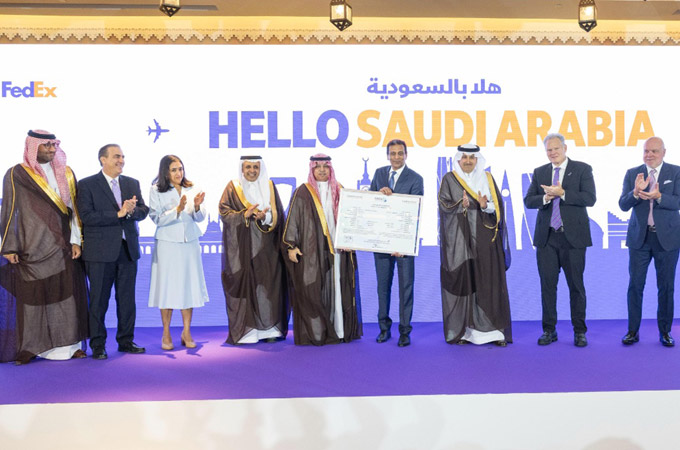Saudi Arabia's General Authority of Civil Aviation (GACA) has granted FedEx an economic licence to operate as a foreign air carrier in the Kingdom.
This markes a major step in advancing the Kingdom’s transport and logistics objectives in support of Vision 2030, said a statement.
The announcement was made during the inauguration ceremony of FedEx Saudi Arabia's Head Office in Riyadh, attended by the Minister of Transport and Logistic Services, Abdulaziz Al-Duailej, President of GACA, and senior government and aviation officials.
The licence reflects Saudi Arabia’s commitment to strengthening air cargo capacity and connectivity in line with the Transport and Logistics Strategy target of handling 4.5 million tonnes of cargo annually by 2030. As part of this expansion, FedEx will operate 24 dedicated cargo flights per month through King Khalid International Airport in Riyadh.
Starting September 2, 2025, FedEx began operating its direct flights to Riyadh, and onwards connectivity to GCC countries. This will help facilitate cross-border trade and support national efforts to achieve the goals of Saudi Vision 2030, positioning the Kingdom as a leading global logistics hub.
“GACA’s award of an economic licence to FedEx will provide consumers and businesses with faster, more convenient logistics solutions, enabling the Kingdom’s broader economic growth as a leading global logistics hub,” said Awad Al-Sulami, GACA’s Executive Vice President for Economic Policies and Logistics Services, as he emphasized the strategic significance of this step. “FedEx investment in its expanded presence reflects the confidence of global partners in the competitiveness of our aviation sector, the transparency of our regulatory environment, and the ambition of Vision 2030.”
The announcement builds upon Saudi aviation’s record-breaking growth, with 463,800 flights (+4 percent) operating in January-June 2025, the highest ever first-half result. These flights carried 575,000 tons of air cargo and 66.7 million passengers.
GACA has enacted significant regulatory reforms to enable growth across the aviation sector, including new economic regulations in November 2023 to boost competition and set a level playing field for global operators and investors in the Kingdom. The economic regulations opened ground handling services and air cargo sectors to competition, supported by a significant cargo and logistics infrastructure investment program that includes the establishment of the Riyadh Integrated Special Logistics Zone. - TradeArabia News Service






























